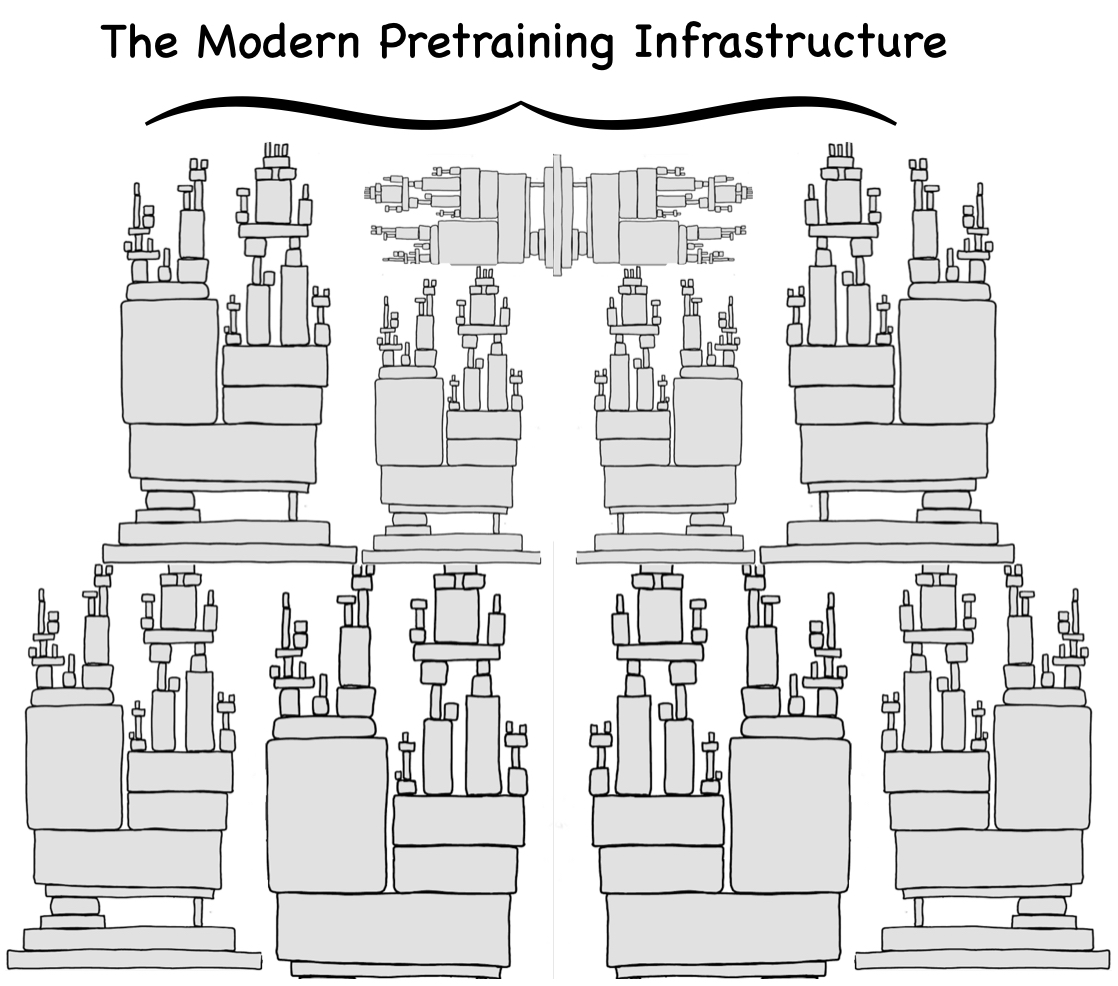LLMs on Aurora: Hands-On
🍋 ezpz
2025-05-07
📍 Currently
💬 LLMs on Aurora
- 🍋
ezpz - 🤗
transformers - 🏎️
Megatron-DeepSpeed
🍋 ezpz
Write once, run anywhere
🐣 Getting Started
Submit interactive job:
Source1 the
ezpz/bin/utils.shscript (usingcurlto download it2):
🏖️ Shell Environment
Setup environment:
🔍 Environment Setup with ezpz_setup_env
- Wrapper around
ezpz_setup_job&&ezpz_setup_python
ezpz_setup_job: Determine the specifics of our active (PBS, SLURM) job1ezpz_setup_python:- if @ ALCF:
- Load the appropriate modules and activate base
condaenv
- Load the appropriate modules and activate base
- else:
- Look for an active
condaenvironment- If found, use it to build a new virtual environment
- Look for an active
- Activate the newly created
venvs/$(basename ${CONDA_PREFIX})environment
- if @ ALCF:
⏱️ Working with Job Scheduler(s)
ezpzintegrates directly with the ALCF job scheduler1- has mechanisms for getting information about our currently running jobs
- 🪄 Automagically:
- Determine the specifics of our active (PBS, SLURM) job
(e.g.${NHOSTS},${NGPU_PER_HOST},${NGPUS}, …) - Load the appropriate modules2
- Create (or activate) a virtual environment on top of a base conda environment
- Determine the specifics of our active (PBS, SLURM) job
🔄 Use Custom Node Lists
Experiment1 with custom
hostfile(s), e.g.:
🐍 Python Environments
- ALWAYS work inside a virtual environment
- best practice is to maintain separate virtual environments for:
- each project you work on
- different versions of a specific package you’re working with
e.g you would want different envs fortorch==2.Xvstorch==2.Y
- Mangled python environments are one of the most common issues faced by users
- best practice is to maintain separate virtual environments for:
📦 Install ezpz
Install1:
Run distributed test:
Launch any python from python
Launch a module:
Launch a python string:
➕ How to Modify Existing Code
✨ Features
Initializing PyTorch across multiple processes
Automatic device detection (
xpu,cuda,mps,cpu, …)Automatic (single-process) logging
Distributed debugger:
🧪 Experiment Tracking
import ezpz
rank = ezpz.setup_torch()
logger = ezpz.get_logger(__name__)
if rank == 0: # -- [1.] --
try:
_ = ezpz.setup_wandb(
"ezpz.examples.minimal"
)
except Exception:
logger.exception(
"Failed to initialize wandb, continuing without it"
)
# ...build {model, optimizer}, etc...
for i in range(train_iters):
metrics = train_step(...)
logger.info( # -- [2.] --
history.update(metrics) # -- [3.] --
)
if rank == 0:
history.finalize()- Initialize W&B (if
WANDB_DISABLEDis not set) - Log summary of metrics to stdout
- Update
history.historywith metrics1
🤏 Minimal Example
import os
import time
import ezpz
import torch
logger = ezpz.get_logger(__name__)
class Network(torch.nn.Module):
def __init__(
self,
input_dim: int,
output_dim: int,
sizes: list[int] | None,
):
super(Network, self).__init__()
nh = output_dim if sizes is None else sizes[0]
layers = [torch.nn.Linear(input_dim, nh), torch.nn.ReLU()]
if sizes is not None and len(sizes) > 1:
for idx, size in enumerate(sizes[1:]):
layers.extend(
[torch.nn.Linear(sizes[idx], size), torch.nn.ReLU()]
)
layers.append(torch.nn.Linear(sizes[-1], output_dim))
self.layers = torch.nn.Sequential(*layers)
def forward(self, x: torch.Tensor) -> torch.Tensor:
return self.layers(x)
@ezpz.timeitlogit(rank=ezpz.get_rank())
def train(
model: torch.nn.Module, optimizer: torch.optim.Optimizer
) -> ezpz.History:
unwrapped_model = (
model.module
if isinstance(model, torch.nn.parallel.DistributedDataParallel)
else model
)
history = ezpz.History()
device_type = ezpz.get_torch_device_type()
dtype = unwrapped_model.layers[0].weight.dtype
bsize = int(os.environ.get("BATCH_SIZE", 64))
isize = unwrapped_model.layers[0].in_features
warmup = int(os.environ.get("WARMUP_ITERS", 10))
log_freq = int(os.environ.get("LOG_FREQ", 1))
model.train()
for step in range(int(os.environ.get("TRAIN_ITERS", 500))):
with torch.autocast(
device_type=device_type,
dtype=dtype,
):
t0 = time.perf_counter()
x = torch.rand((bsize, isize), dtype=dtype).to(device_type)
y = model(x)
loss = ((y - x) ** 2).sum()
dtf = (t1 := time.perf_counter()) - t0
loss.backward()
optimizer.step()
optimizer.zero_grad()
dtb = time.perf_counter() - t1
if step % log_freq == 0 and step > warmup:
logger.info(
history.update(
{
"iter": step,
"loss": loss.item(),
"dt": dtf + dtb,
"dtf": dtf,
"dtb": dtb,
}
)
)
return history
@ezpz.timeitlogit(rank=ezpz.get_rank())
def setup():
rank = ezpz.setup_torch()
if os.environ.get("WANDB_DISABLED", False):
logger.info("WANDB_DISABLED is set, not initializing wandb")
elif rank == 0:
try:
_ = ezpz.setup_wandb(
project_name=os.environ.get(
"PROJECT_NAME", "ezpz.examples.minimal"
)
)
except Exception:
logger.exception(
"Failed to initialize wandb, continuing without it"
)
device_type = ezpz.get_torch_device_type()
model = Network(
input_dim=int((os.environ.get("INPUT_SIZE", 128))),
output_dim=int(os.environ.get("OUTPUT_SIZE", 128)),
sizes=[
int(x)
for x in os.environ.get("LAYER_SIZES", "1024,512,256,128").split(
","
)
],
)
model.to(device_type)
model.to((os.environ.get("DTYPE", torch.bfloat16)))
logger.info(f"{model=}")
optimizer = torch.optim.Adam(model.parameters())
if ezpz.get_world_size() > 1:
from torch.nn.parallel import DistributedDataParallel as DDP
model = DDP(model, device_ids=[ezpz.get_local_rank()])
return model, optimizer
def main():
model, optimizer = setup()
history = train(model, optimizer)
if ezpz.get_rank() == 0:
dataset = history.finalize()
logger.info(f"{dataset=}")
if __name__ == "__main__":
main()🏃♂️ Running the Minimal Example
To run the previous example we:
Source the
ezpzutils script:Setup our environment:
Run the example:
📝 ezpz-test
ezpz-testis a simple test script that trains a small model using DDP across all available GPUs- It will automatically detect the number of GPUs and launch an appropriate
mpiexeccommand to run the training script across all GPUs
- It will automatically detect the number of GPUs and launch an appropriate
See: ezpz/test.py
Command:
🦜 Generate Text
See: ezpz/generate.py
Command:
🤗 Huggingface Trainer
Command:
ezpz-launch -m ezpz.hf_trainer \ --dataset_name=eliplutchok/fineweb-small-sample \ --streaming \ --model_name_or_path=meta-llama/Llama-3.2-1B \ --bf16=true \ --do_train=true \ --do_eval=true \ --report-to=wandb \ --logging-steps=1 \ --include-tokens-per-second=true \ --block-size=128 \ --max-steps=10 \ --include-num-input-tokens-seen=true \ --auto_find_batch_size=true \ --gradient_checkpointing=true \ --optim=adamw_torch \ --overwrite-output-dir=true \ --logging-first-step \ --include-for-metrics='inputs,loss' \ --max-eval-samples=50 \ --ddp-backend=ccl
🏎️ Megatron-DeepSpeed
🙌 Acknowledgements
This research used resources of the Argonne Leadership Computing Facility, which is a DOE Office of Science User Facility supported under Contract DE-AC02-06CH11357.
